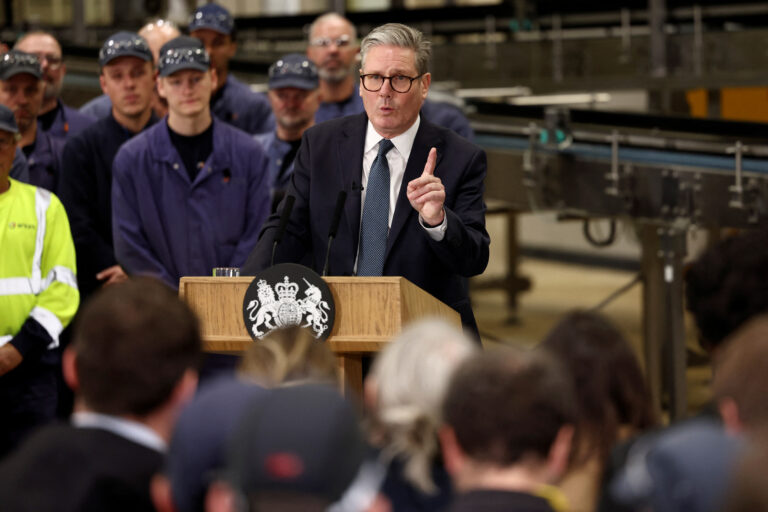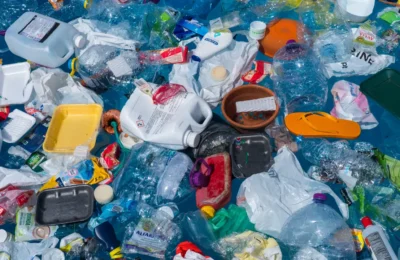From Novara Media
Labour’s Plans to Capture Carbon Are Designed for Fossil Fuel Giants, Not the Climate
But saying so makes you a ‘drum-banging extremist’, apparently.
by Edward Donnelly
8 October 2024

According to Keir Starmer, anyone who criticises the government’s plan to transfer billions of pounds to the fossil fuel industry for risky projects to capture carbon dioxide is a “drum-banging, finger-wagging extremist”.
Last week, the prime minister took to the pages of The Sun to pit “working people” against climate activists, raising the spectre of shuttered factories and “a slow decline to the dark ages” if Labour doesn’t deliver £22bn in subsidies for carbon capture and storage infrastructure – also known as “CCS”.
Labour’s PR team would have you believe that the government’s scheme centres on capturing carbon from existing industries. Instead, the plans are an extraordinary coup for oil and gas companies, funnelling public wealth to finance new fossil fuel infrastructure in Britain.
In a copy-and-paste of the Conservative party’s plans for carbon capture, Labour will subsidise several new projects to produce “blue hydrogen”, a wasteful creation of fossil fuel companies to preserve their natural gas market while giving the appearance of climate action.
“Blue hydrogen” is produced using copious amounts of climate-heating natural gas, with some carbon emissions captured in the process. Since the hydrogen fuel itself burns cleanly, fossil fuel companies claim that it’s a way to “decarbonise” natural gas.
If only such a magic trick were so simple. Besides some carbon escaping into the atmosphere at the hydrogen plants themselves, there is the trail of climate-heating methane emissions leading to production wells thousands of miles away, whether they be in Texas or Qatar.
With domestic North Sea oil and gas production in rapid decline, Britain is increasingly importing gas in its more expensive and polluting liquefied form. That means more emissions from overseas production, price shocks, and energy insecurity.
Blue hydrogen production is also highly inefficient, with about 50% more natural gas consumed per unit of energy than from simply burning natural gas itself.
This increased gas demand is great news for BP, Eni, Equinor and Essar, all multinational oil and gas producers which the government would pay to capture and store emissions from blue hydrogen production.
Nevermind that there isn’t even a viable market for blue hydrogen in Britain, despite fossil fuel companies’ recent push to roll-out hydrogen home heating systems in towns such as Redcar and Whitby, the very blue-collar constituencies Starmer says he is championing.
Last year, Redcar and Whitby residents rose up against the Tory-backed “hydrogen village” trial projects, protesting an experiment of which they had no part in choosing.
Redcar, which is located in the Teesside industrial area near Middlesbrough, is also slated to be the site of another creation of the fossil fuel industry: a £1.4bn brand-new “net-zero” gas-fired power plant with carbon capture technology, backed by BP and Norwegian oil giant Equinor.
No company has ever built such a power plant anywhere in the world, but Equinor and BP will get public subsidies to burn natural gas and call it “net zero”. Even if the companies can capture over 90% of the plant’s carbon dioxide emissions as they claim, their emissions projections conveniently omit the carbon released from producing and transporting the gas.
Meanwhile, the UK economy faces the very serious challenge of phasing out several dozen operating gas-fired power plants, none of which have been shortlisted for carbon capture subsidies. According to the government’s current policy, all electricity generation must be “net zero” by 2035, and Labour says it intends to move this target up to 2030.
Rather than giving workers at these gas-fired power plants a real exit plan, Labour is giving subsidies for BP to enter into Britain’s power generation market for the first time. This favouritism bears the marks of the UK’s well-organised fossil fuel lobby’s efforts to sway carbon capture investments.
Yet Starmer suggests that by opposing such a corporate hand-out, “the jobs of brickies, sparkies and engineers – the backbone of Britain – will be risked”. What about jobs for new-built renewable power generation, electrification of home heating, energy efficiency measures, and grid improvements, which are all needed if the government is to have any hope of meeting its climate targets?
There is a legitimate argument from some climate experts that capturing carbon from certain industries such as cement and lime – the so-called “hard to abate sectors” – could be worth public expenditures to reduce emissions.
But while a cement works and a lime plant are included in the government’s carbon capture shortlist, these projects will likely receive a small fraction of the overall funding pot, capturing a token amount of the UK’s overall emissions.
Precise carbon capture investments should be debated in the context of limited public funds, which are much needed for high-impact investments to rapidly reduce fossil fuel demand to meet climate targets.
Instead, Labour’s scheme to capture carbon is an enormous gift to fossil fuel companies. They are the big winners of the £22bn subsidy announcement, with no regulatory framework or penalties if projects end up failing economically or polluting more than advertised.
With its promises to “reignite” Britain’s industrial heartlands, the government’s plans will do exactly that: burn through large amounts of natural gas and public funds under the guise of climate action.
Edward Donnelly is a contributing journalist to environmental news service DeSmog, currently working on a cross-border investigation into carbon capture and storage projects in the North Sea.




It would be good to have an estimate if the extra energy requirements of CCS on a gas-fired power station. When I last looked 17 years ago, I found a report from the IPCC saying it was 50%. I haven’t investigated since and efficiency improvements may have reduced this bit, but CCS is nonsensical when energy usage should be reduced in order to cut the demand for scarce mineral and other resources.